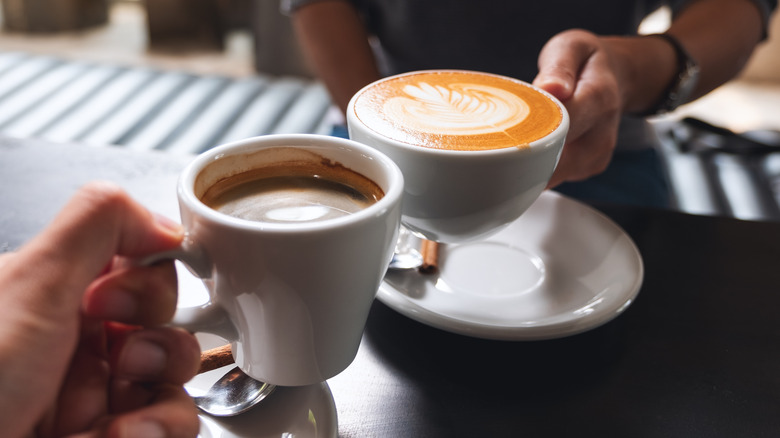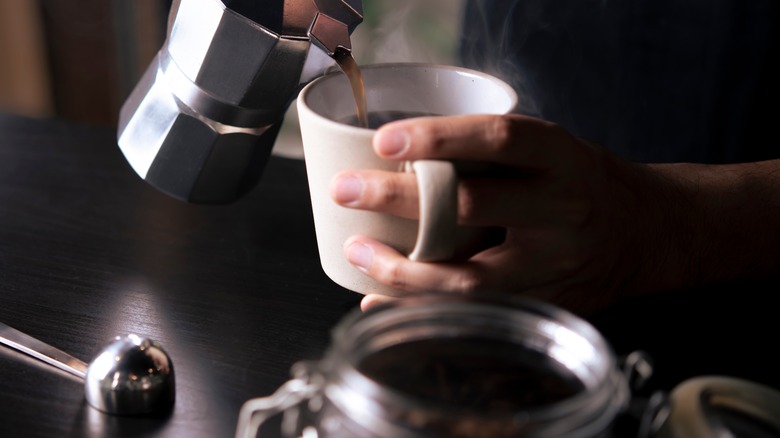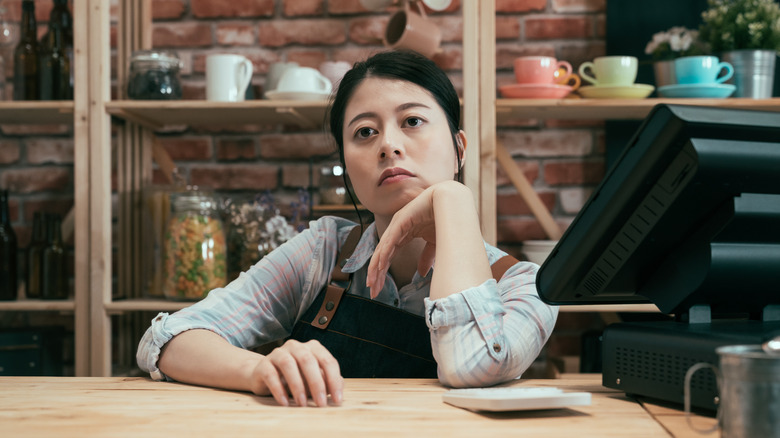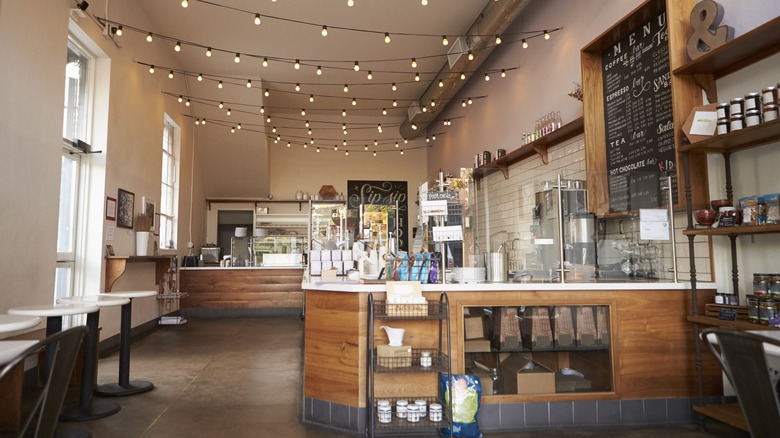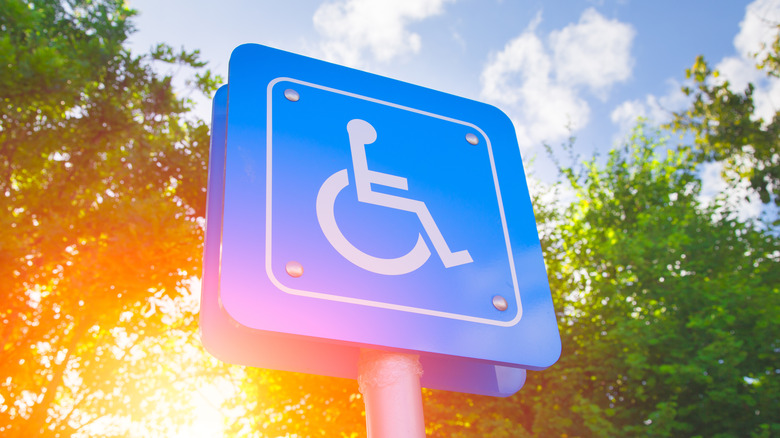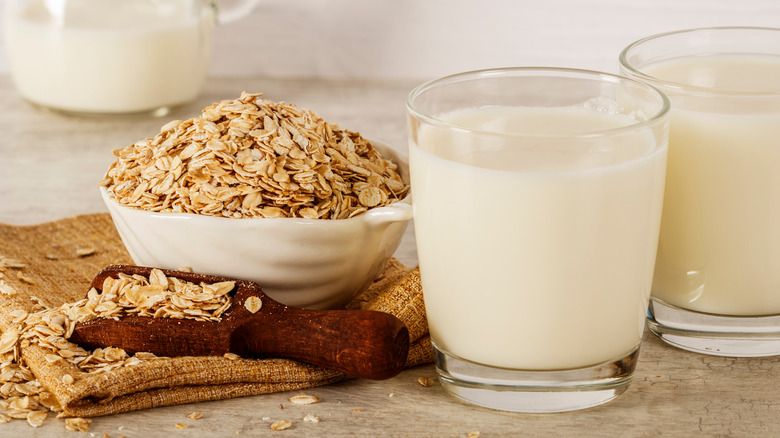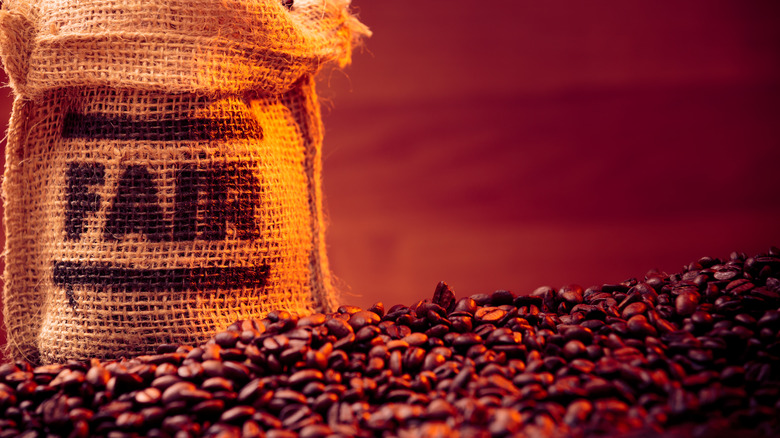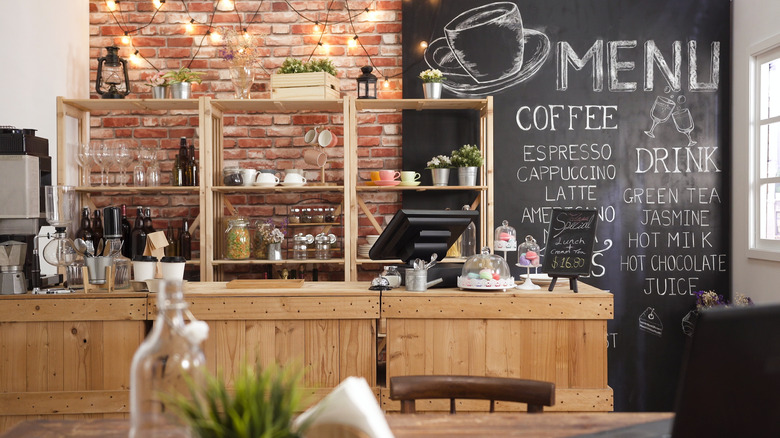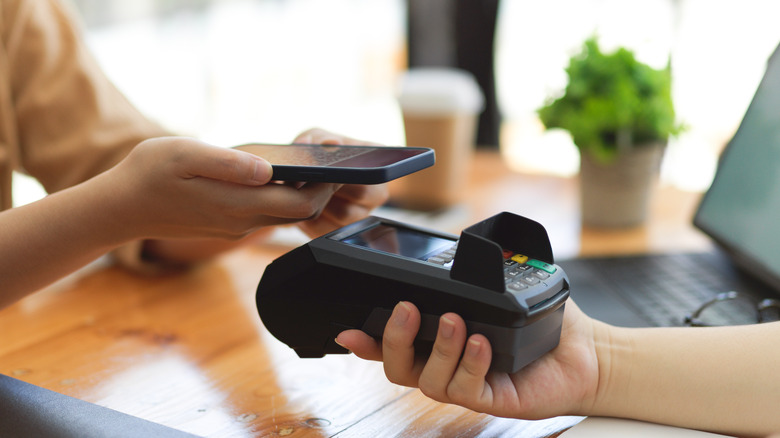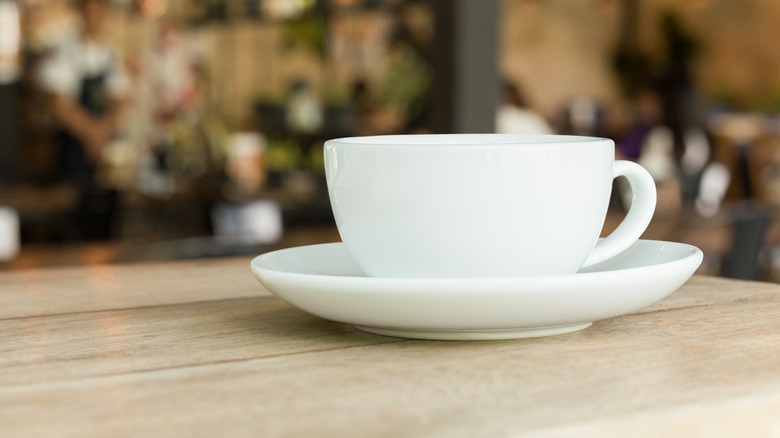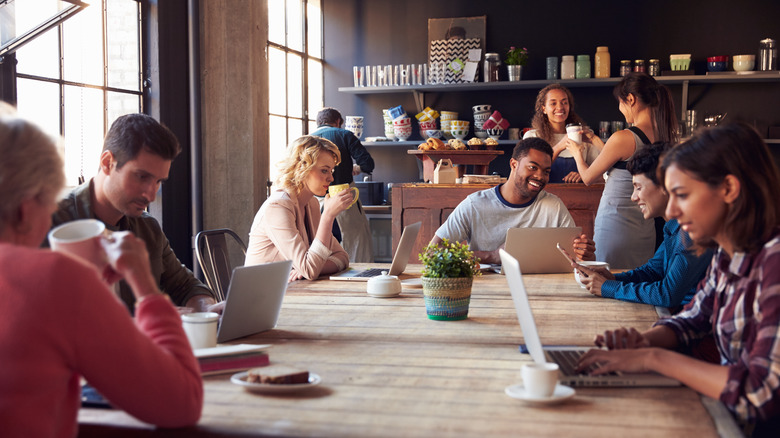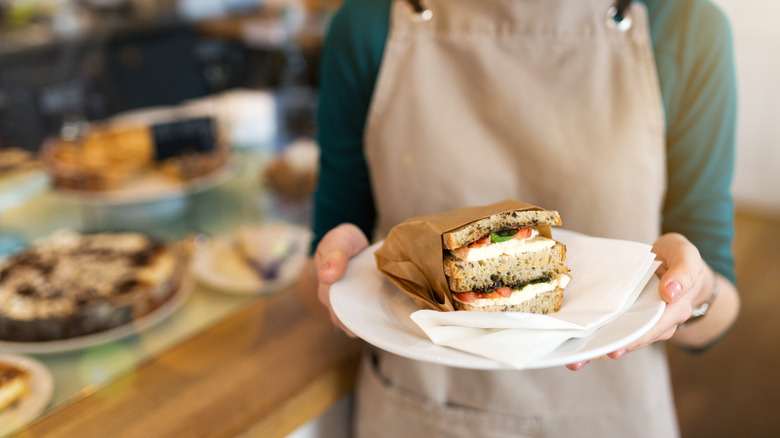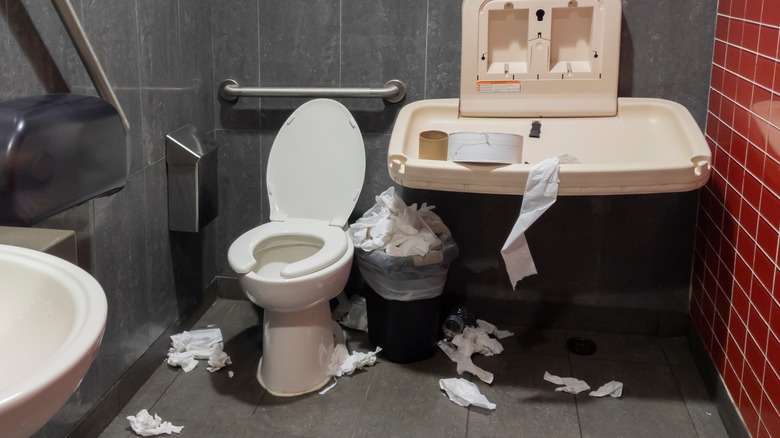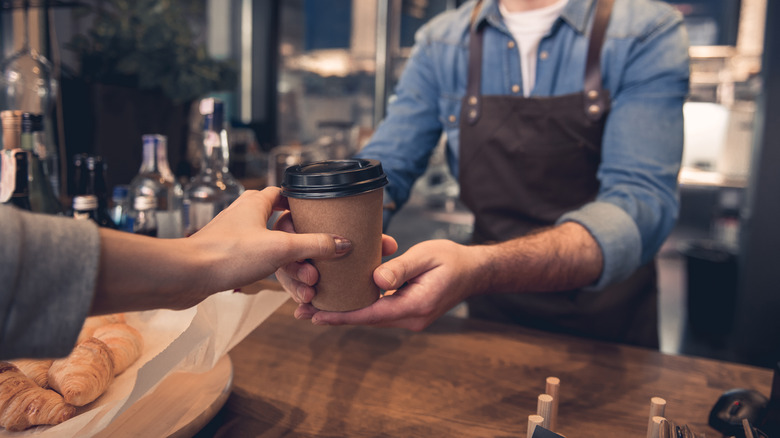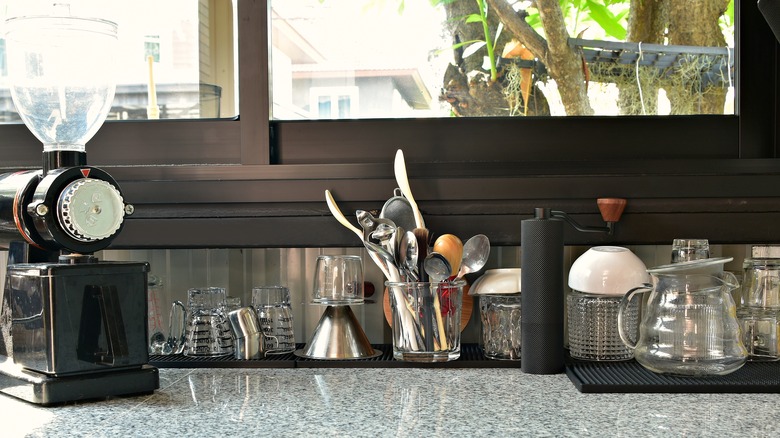15 Signs You're At A Bad Coffee Shop
If you're one of the two-thirds of Americans who take a caffeine hit in the form of coffee on a daily basis, you probably already know the impact a bad coffee shop can have on your morning. This sociable, rejuvenating ritual of gathering in a coffee house may have been around since the fifteenth century (with coffee itself dating back roughy 600 years earlier). But with more than 38,000 coffee shops in the U.S. alone today, it's never been more popular.
Go back just a couple of decades and coffee houses were pretty unoriginal and unremarkable. You might find the odd quirky interior, but the choice was limited to a handful of Italian-invented favorites. Nowadays, we've never had it so good. A walk through any town or city will introduce you to traditional cafes, hipster houses, artistically focused coffee shops, and family-friendly joints. And the namesake drink itself has bloomed from a simple shot of espresso or cup of drip into a myriad of flavor sensations.
However, given that appearances can be deceptive, quality coffee shops are not easy to tell apart from their second-class counterparts. So how do you ensure your day gets off to the best possible start when you're visiting a coffee shop? Look out for these 15 warning signs and you'll never have to endure a below-par brew experience again.
1. Really bad coffee
If the coffee buy from a shop is bad, what's to stop you from staying at home and making a better cup yourself for just a few cents? It goes without saying that a good coffee shop needs good coffee, but we'll say it anyway. However, the distinction between a life-affirming brew and one that leaves you let down, or worse, comes down to several factors.
The flavor in coffee comes from a mix of the beans used, the region it comes from, and the brewing method. Beans are either arabica or robusta, or a blend of both. Most of us in the West are used to arabica, whereas robusta beans contain more caffeine and have a bitter flavor akin to dark chocolate. Furthermore, growing regions produce different flavor profiles due to climate and soil type. And beyond the coffee itself, roasting plays an important role. The best coffee shops roast their beans on site, and as close to grinding time as possible. Finally, the equipment used and the skills of the barista come into play. Even a minor fault with machinery can impair the taste of the finished product.
When it comes to bean types and regions, it's very much down to personal preference. But freshness, on the other hand, is less subjective. If your coffee is stale, sour, or even a little sickly, it's probably been sitting out for too long or gone bad, and your chosen establishment is no place to find caffeine heaven.
2. Melancholy baristas
Just as excellent restaurant service makes a dish taste better, a friendly barista gets your coffee experience off to the best possible start. Miserable employees suggest that something could be wrong with the establishment as a whole. They may be underpaid, undertrained, or simply have no passion for their work — and there's certainly a lot more work that goes into being a barista than you may realize. But at the end of the day, a maker's passion has a direct link to the quality of the finished product.
A great barista will make you feel welcome and tempt you into returning. They'll also have an interest in coffee, and be delighted to share it with you. If a coffee house has a range of beans from different regions, the barista should be happy to discuss taste, roasting times, and any other in-house quirks before taking your order. Melancholy baristas are the perfect warning sign that you're in a bad coffee shop – you're simply not going to have the rejuvenating experience you went in for.
3. An uninviting vibe
The Chinese tradition of feng shui can be defined as the practice of arranging a space to create balance with the world around us. It's an attempt to bring harmony to a room, in much the same way that harmony exists in nature, bringing peace and good energy. Thus, a sure sign of a bad coffee shop is one that doesn't achieve this, perhaps due to an overly-strict layout and lack of seating options. There may be nothing more than rows of desks, straight-backed chairs, and a distinct doctor's waiting room vibe. None of this will help turn your experience into a positive one.
Good coffee houses serve different types of coffee to attract different types of customers, and so need seating to suit all needs, from comfy chairs for courting couples to single desks for remote workers and larger tables for gathering friends. When it comes to designing a coffee shop floor plan, a proprietor should consider the likes of furniture, ample space for customer queues, and enough room for staff to be able to perform their roles. Cramped places with a sterile atmosphere do not make for a good cafe.
4. It's not accessible for everyone
A coffee shop should be welcoming to all. If the proprietor has neglected to make the space wheelchair-friendly, allow guide dogs or offer large-print menus, there's a good chance they've put profit over quality on their overall agenda. Making a coffee shop more accessible also needs to include the likes of easy-grip cups, mobility aids in restrooms, and staff trained to deal with any eventuality. A person with a disability should receive the exact same level of service as someone without, and no one should be excluded from the joys of a caffeine hit.
It's also worth considering accessibility issues for the baristas and service staff. The best cafes will have a clear diversity hiring policy, including those from different races, genders, lifestyle preferences and levels of physical ability. A team with all the same age and background could suggest that a coffee shop that doesn't encourage diversity and equality for all, and who wants to support such a notion?
5. There aren't any dairy alternatives
There's been a steady rise in non-dairy milk drinkers in recent years, with the dairy alternatives market predicted to be worth $61.43 billion by 2029. This is partly due to a greater awareness of the downsides of the dairy industry, combined with health concerns, allergies, or simply personal taste. Much has been published regarding the benefits of different milks, from high protein to low fat content. And when it comes to adding milk to your cup of joe, nut and oat milks naturally complement the flavor of coffee beans, and for many, variety is the spice of life.
Given the growth of the non-dairy milk industry, shops that stick rigidly to cow's milk are simply failing to meet the needs of their customers. The demand is most certainly there, and the best cafes may go so far as to make their own nut milks on the premises in order to guarantee freshness. We've come a long way from having a simple choice of black coffee or a splash of cream, and a good cafe menu will reflect this.
6. There's no commitment to sustainability
If a coffee shop doesn't care about the world, how can it care about your drink? Sustainability and ethics have long been big issues when it comes to the coffee industry, with many growers around the world working for very little money, and importers and sellers reaping all the benefits of others' hard labor. Given that most coffee comes to the West via Africa, South America or Asia, there's a carbon footprint issue, too. Gallons of plane fuel are pumped into the atmosphere, purely to allow us caffeine junkies to enjoy our daily dose. And who wants to drink coffee with a guilty conscience?
Sustainability in a complex supply chain is no easy thing to achieve, but it's possible for coffee shops to take steps in the right direction. If you can find certifications such as Organic or Fair Trade on a cafe's beans, you'll be looking at a more sustainable coffee shop. Beyond the brown stuff itself, Coffee Shop Startups suggests that cafes can become greener by sourcing local milk, using recyclable or compostable cups, and composting coffee grounds (or giving them away for customers to do so). Issues such as sustainability and climate change affect us all, and choosing where we drink our coffee is an easy way to make a contribution to the cause.
7. The drink selection is lacking
The coffee selection should come first in any coffee shop, but completely ignoring the needs of non-coffee drinkers gives off an inconsiderate vibe. Even the biggest caffeine lovers might need to take a break from their craving from time to time, and they shouldn't need to find a different cafe in which to do so. Just as with serving different types of milk, any coffee shop that fails to offer good alternatives to coffee itself is failing to meet the needs of its customers.
Give that menu a thorough inspection. There should be a fine selection of coffees, alongside an equally enchanting range of teas, fresh fruit juices, perhaps even smoothies, and other non-caffeinated beverages. Extra brownie points can be awarded to coffee shops that also introduce seasonal drinks, such as hot apple cider in the winter, as recommended by the Barista Training Academy. All should be made to feel welcome, not just the dedicated coffee drinkers.
8. Prices don't reflect the overall experience
If you've ever hyperventilated after being charged $5 or more for a cup of regular coffee, you're not alone. However, before abandoning coffee houses forever in favor of the cheaper home-brewed variety, it's worth considering the following: Coffee at cafes is so expensive because of the countless overheads involved. These include the coffee itself — not to mention the sweeteners and creamers that are typically offered free of charge — as well as barista wages, equipment maintenance, and rental costs. Many cafes actually take a loss on their coffee, pulling most of their profits from the snacks they sell instead.
All that said, good coffee shops will have price points that reflect what you're paying for. Expect to pay more for sustainable coffee, single origin blends, premium service, and a beautiful environment. If you're needing to take out a small loan to buy average coffee in an uninviting atmosphere, that particular coffee house simply isn't worth your time or money.
9. It starts and ends with coffee
Just like a bar serving alcoholic beverages, a coffee shop should be a focal point for the community. With so much competition around, it's the most innovative coffee shops that are able to ride out the harder times and maintain a loyal customer base. On a basic level, this may include incentives such as rewards programs, play areas for children, or reduced costs for food items sold later in the day. These are all signs that a coffee shop wants your business and is in it for the long haul.
The best of their kind might double up as an art space, with pictures from local artists on the walls. They might run a book swap library, where people can take in a tome of their own and swap it for one on the shelf. They may open after-hours to allow for children's clubs, reading groups, or a theater space. Coffee shops that only do the bare minimum are likely cutting corners elsewhere.
10. The crowd isn't diverse
Ever entered a coffee shop to catch up on an hour's gossip with a friend, only to be met by rows of hostile faces looking up to see who's disturbed the peace? That's a sign of a bad coffee shop if ever there was one. The thrill of the cafe experience should never be exclusive – these places belong to everyone.
Young people may enjoy the scene to chat, study together, or catch up on social media. Older people may descend on a cafe to rest in the afternoon after a busy day working or otherwise. Families may visit a coffee shop simply to get out of the house for an hour on weekends. And of course, let's not forget the freelancers and remote workers who need a lively setting to get their creative juices flowing. Everyone should feel at home in a cafe. Should you ever step into one and feel out of place, something is most definitely wrong.
11. The WiFi sucks
We've come a long way from the days in which coffee shops would charge customers a fee for using their WiFi. That particular debate is over – any public establishment seen charging these days is likely to be blacklisted via social media and ignored by most. In modern times, public WiFi is pretty much seen as a basic human necessity, and viewed as an essential ingredient to the coffee shop experience in much the same way that cream and sugar once were.
So the debate has shifted from cost to speed. Equipment suppliers Restaurantware published a list of reasons why giving WiFi away for free can actually benefit your business in the long term. The same is now true for fast WiFi speed. As we've asserted, coffee is for all types of people, and all types of people are more likely to stay – and buy more coffee – if a shop's WiFi is fast. Think social media fans, remote workers, and those who've popped in to catch up on some online reading or studying. If the WiFi is too slow, the glorious coffee shop experience will be ruined for the huge majority of visitors.
12. The food is out of sync
A beautifully-cooked lobster thermidor has tempted many a tastebud, but there's a time and place. Although most of us frequent coffee shops for a heady dose of caffeine, it's always a delight to find a morsel to fill up on for breakfast or keep us sated in between meals.
You can tell a lot about a cafe from its food selection. If you're finding overly extravagant dishes on the menu, chances are you're in a place that's struggling to discover its identity. The best coffee shops put the coffee first and then heighten the experience through a well-thought-out selection of supporting snacks. the coffee experts at HomeGrounds suggest a variety of fruits to accompany coffee, alongside chocolate, tarts, cheese, and even bread and meat (aka a great sandwich). Many a good coffee shop has let itself down by seemingly picking its food selection at random. Just like pairing the right dish with the right wine, a good menu needs to heighten the drinker's experience, and not merely be full of over-the-top options. It's the thought that counts.
13. You remember the restroom for all the wrong reasons
An unwashed restroom bereft of tissue and hand soap can soil (pun intended) even the best coffee shop experience. Who wants to spend an hour imbibing single origin Java in a debonair fashion, only to then have one's stomach turned when Mother Nature calls? Even the hippest establishments score a great big no if they can't use a mop and bucket.
Of course, it's not just poor bathroom hygiene that can make for a poor cafe. Cleaning a coffee machine is as vital an ingredient towards a great-tasting drink as anything else. If grounds and coffee oils are not removed from equipment, they'll go stale and eventually result in a highly bitter brew. You'll also recall Manhattan Starbucks' workers striking over alleged unsanitary conditions. If a coffee shop can't get its hygiene in order, it's naturally a bad omen for the rest of its service offering.
14. Customers aren't respectful
We've all stood behind someone too enthralled by an ongoing phone call to give a barista their full attention. It's not just ungracious to the person who's trying to do their job, but it delays service and shows no regard for the other people lining up behind them. Or perhaps you've experienced a customer hogging a charging outlet with multiple devices, playing video games without headphones, or resting their feet on the chairs.
Rude coffee shop habits aren't something that any establishment can totally eradicate, but if there's an excess of such behavior in a coffee shop, it's a sure sign that something's wrong somewhere. Even if a cafe happens to sell your favorite blend of beans and has modernist furniture designed by an Italian master, a high number of rude customers means it's time to seek your fix elsewhere. Good coffee shops mean loyal customers, long-term staff-customer relationships, and an accommodating ambience overall.
15. Cheap and unkept coffee equipment
Great tasting coffee is a threefold process: the product itself, the talents of your barista, and the machinery that your coffee is made with. This includes everything from the roasting process to the grinding and filtration. Although we can all empathize with a small startup trying to save a few dollars by investing in an affordable machine, the difference that good gear can make to the taste of the finished product is remarkable. Cheap coffee equipment is also harder to clean and more prone to breakdown — and it's a classic trait of a bad coffee shop.
Furthermore, a good cafe will have a selection of vessels for different types of drinks, from large, wide-mouthed coffee mugs to tall, slender glasses for iced drinks and other beverages. Just like drinking wine or whiskey, the material, shape and color of the cup impacts upon the flavor, according to the experts at Best Coffee. If a coffee shop has poor equipment and a lack of thoughtful dishware, they're cutting corners and not providing the service that paying customers deserve.
